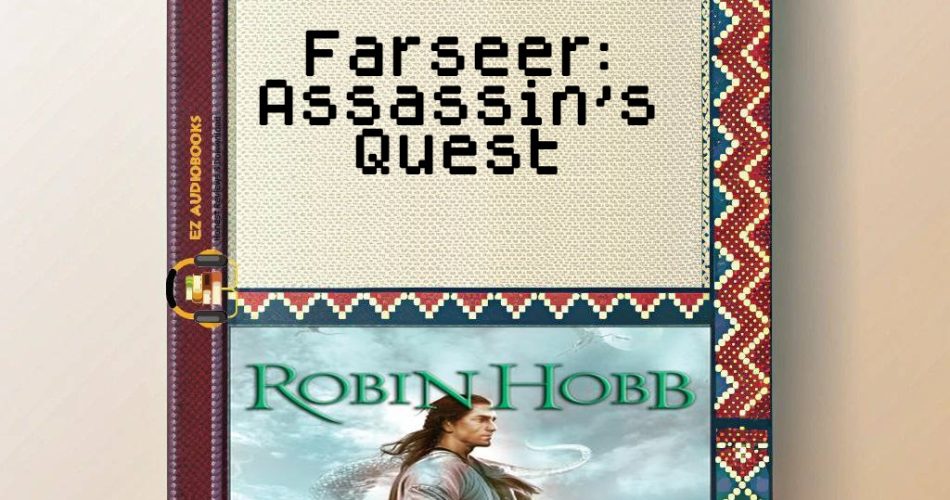Audiobook Sample
Listen to the sample to experience the story.
Please wait while we verify your browser...
- Title: Farseer: Assassin’s Quest
- Author: Robin Hobb
- Narrator: Paul Boehmer
- Length: 37:42:00
- Version: Abridged
- Release Date: 03/08/2010
- Publisher: Tantor Media
- Genre: Science Fiction & Fantasy, Epic Fantasy
- ISBN13: 9.78E+12
There’s a particular magic to listening to epic fantasy while moving through the world – the way the landscape outside your window becomes the story’s backdrop, how the rhythm of travel syncs with the narrator’s cadence. I first discovered this alchemy years ago driving through Chile’s Atacama Desert with García Márquez whispering in my ears, and I found it again with Robin Hobb’s “Farseer: Assassin’s Quest”, narrated by Paul Boehmer. This final installment of the Farseer trilogy isn’t just a fantasy novel – it’s a raw, intimate exploration of trauma and resilience that stayed with me long after the last chapter.
Hobb’s prose has always felt like sitting with that Oaxacan grandmother from my travels – her stories unspool slowly, rich with emotional truth and hard-won wisdom. “Assassin’s Quest” finds FitzChivalry Farseer at his most broken, believed dead by friend and foe alike, yet still carrying the weight of a kingdom’s survival. What struck me most was how Hobb makes you feel every ache of Fitz’s healing body, every tremor of his wounded psyche. The magic system here – particularly the Wit and the Skill – becomes less about supernatural abilities and more about profound metaphors for human connection and alienation.
Paul Boehmer’s narration is a masterclass in restraint. He doesn’t perform this story so much as channel it, his voice becoming a conduit for Fitz’s pain. Listen to how he handles the quiet moments – the space between sentences when Fitz is wrestling with his demons – and you’ll hear echoes of those Oaxacan storytelling nights where silence spoke volumes. Boehmer’s character voices are distinct without being cartoonish, particularly his raspy portrayal of the old assassin Chade and the wolf Nighteyes’ thought-speech, which carries just the right animalistic cadence.
The audiobook’s 27-hour runtime might seem daunting, but like a long train journey through changing landscapes, the time becomes part of the experience. Hobb’s worldbuilding unfolds gradually – the Six Duchies’ political machinations, the Elderlings’ mysterious ruins, the visceral horror of the Red Ship Raiders – all given texture by Boehmer’s nuanced delivery. Some listeners might find the pacing slower than modern fantasy standards, but that’s like complaining about the length of a mountain trek; the slowness is where the transformation happens.
Where the audio experience particularly shines is in the Skill sequences – those moments of psychic connection that could easily feel hokey in less skilled hands. Boehmer layers his voice subtly during these passages, creating an eerie resonance that makes you feel the magic’s disorientation. The scene where Fitz finally reaches Verity? I had to pull my car over because the emotional weight, amplified by Boehmer’s delivery, demanded my full attention.
Comparisons to George R.R. Martin’s work are inevitable – both authors excel at political intrigue and reluctant heroes – but Hobb’s focus remains intensely personal where Martin zooms out to the epic. If you loved the psychological depth of “The Broken Earth” trilogy or the bond between human and animal in “The Golden Compass”, this will resonate. That said, be warned: this isn’t escapist fantasy. Like that Atacama journey where the desert’s harshness mirrored García Márquez’s themes, “Assassin’s Quest” asks you to sit with discomfort – Fitz’s self-destructive choices, the cost of vengeance, the way trauma lingers in the body.
The production quality is solid, though not exceptional – no immersive sound effects or music, just clean narration. This actually serves the story well; anything more theatrical might have cheapened Hobb’s intimate tone. My only critique is that Boehmer’s female voices occasionally blend together, though his portrayal of the Fool remains hauntingly androgynous, perfect for this enigmatic character.
What surprised me most was how contemporary the themes felt despite the medieval setting. Fitz’s struggle with identity – bastard, assassin, king’s man, wolf’s brother – mirrors our modern crises of self. His journey isn’t about becoming a hero, but about learning to live with the pieces of himself he’s tried to deny. There’s a moment where Nighteyes tells Fitz, ‘You are pack,’ that hit me with the same quiet power as those Oaxacan grandmother’s stories about community and belonging.
For those new to the series, start with “Assassin’s Apprentice” – this conclusion won’t resonate without the foundation. But for returning readers, this audio version adds new layers to familiar moments. The scene where Fitz buries his childhood? Hearing Boehmer’s voice crack ever so slightly made me experience it anew.
As someone who’s written about personal transformation across cultures, I admire how Hobb uses fantasy to explore universal human experiences. The Skill isn’t just magic – it’s the way we’re shaped by those who truly see us. The Wit isn’t just animal bonding – it’s about finding connection when human relationships fail. These themes linger like the taste of strong mezcal after one of those Oaxacan storytelling nights – harsh at first, then warming, then impossible to forget.
With stories in my ears and the open road ahead,
Marcus Rivera

